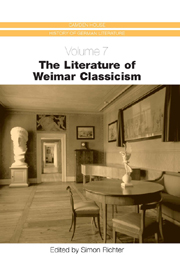Book contents
- Frontmatter
- Contents
- List of Illustrations
- Preface and Acknowledgments
- Conventions, Editions, and Abbreviations
- Introduction
- What is Classicism?
- Antiquity and Weimar Classicism
- The Correspondents' Noncorrespondence: Goethe, Schiller and the Briefwechsel
- Johann Gottfried Herder: The Weimar Classic Back of the (City)Church
- Drama and Theatrical Practice in Weimar Classicism
- German Classical Poetry
- The Novel in Weimar Classicism: Symbolic Form and Symbolic Pregnance
- German Women Writers and Classicism
- Weimar Classicism as Visual Culture
- The Irrelevance of Aesthetics and the De-Theorizing of the Self in “Classical” Weimar
- Goethe's “Classical” Science
- The Political Context of Weimar Classicism
- Bibliography
- Notes on the Contributors
- Index
The Political Context of Weimar Classicism
Published online by Cambridge University Press: 05 February 2013
- Frontmatter
- Contents
- List of Illustrations
- Preface and Acknowledgments
- Conventions, Editions, and Abbreviations
- Introduction
- What is Classicism?
- Antiquity and Weimar Classicism
- The Correspondents' Noncorrespondence: Goethe, Schiller and the Briefwechsel
- Johann Gottfried Herder: The Weimar Classic Back of the (City)Church
- Drama and Theatrical Practice in Weimar Classicism
- German Classical Poetry
- The Novel in Weimar Classicism: Symbolic Form and Symbolic Pregnance
- German Women Writers and Classicism
- Weimar Classicism as Visual Culture
- The Irrelevance of Aesthetics and the De-Theorizing of the Self in “Classical” Weimar
- Goethe's “Classical” Science
- The Political Context of Weimar Classicism
- Bibliography
- Notes on the Contributors
- Index
Summary
The period covered by this volume, from the publication of some central classical works in 1787 to Schiller's death in 1805, roughly coincides with the period of the impact of the French Revolution in Germany and the dissolution of the Holy Roman Empire. The events from the storming of the Bastille in 1789 to Napoleon's declaration in 1799 that the Revolution had ended were almost as cataclysmic for mentalities in Germany as they were in France. In literature the importance of this political matrix was so great that many newer histories of German literature identify the epoch of German Classicism and Romanticism by reference to the revolutionary period. However, the overdue attention to the upheaval in both politics and literature caused by the French Revolution should not distract attention from the important political structures and mentalities that reveal considerable continuity from the pre-revolutionary into the revolutionary period in Germany.
Eighteenth-century “Germany” was a patchwork of hundreds of tiny to large sovereign states, held together loosely in the Holy Roman Empire, which was laid to rest by Napoleon in 1806 following a period of increasing irrelevance. Most of these territories were monarchies. The Empire exerted minimal control over sovereigns, mainly in the form of legal courts that communities or individuals could use against the power of their prince.
- Type
- Chapter
- Information
- The Literature of Weimar Classicism , pp. 347 - 368Publisher: Boydell & BrewerPrint publication year: 2005



